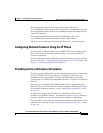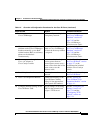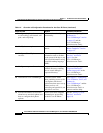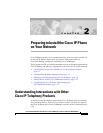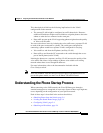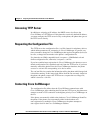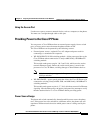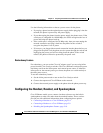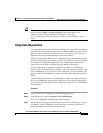
Chapter 2 Preparing to Install the Cisco IP Phone on Your Network
Understanding the Phone Startup Process
2-4
Cisco IP Phone Administration Guide for Cisco CallManager 3.2, Cisco IP Phones 7960/7940/7910
78-10453-04
• Accessing TFTP Server, page 2-5
• Requesting the Configuration File, page 2-5
• Contacting Cisco CallManager, page 2-5
Obtaining Power from the Switch
You can connect the Cisco IP Phone to a Cisco Catalyst switch with one of the
modules that provides power to the phone (WS-X6348-RJ45V). See the
“Providing Power to the Cisco IP Phone” section on page 2-7 for details.
If you use this optional configuration, the phone receives phantom power and
powers up when you connect the Cisco IP Phone to the switch. The phone then
sends Cisco Discovery Protocol (CDP) notifications to the switch indicating it is
ready to receive CDP packets and indicating the power requirement for the phone.
The switch allocates power and sends it over the network cable.
Loading the Stored Phone Image
The Cisco IP Phone has non-volatile Flash memory in which it stores firmware
images and user-defined preferences. At startup, the phone runs a bootstrap loader
that loads a phone image stored in Flash memory. Using this image, the phone
initializes its software and hardware.
Configuring VLAN
If the Cisco IP Phone is connected to a Cisco Catalyst switch, the switch next
informs the phone of the voice VLAN defined on the switch. The phone needs to
know its VLAN membership before it can proceed with the Dynamic Host
Configuration Protocol (DHCP) request for an IP address.
Obtaining an IP Address
If the Cisco IP Phone is using DHCP to obtain an IP address, the phone queries
the DHCP server to obtain one. If you are not using DHCP in your network, you
must assign static IP addresses to each phone locally.




